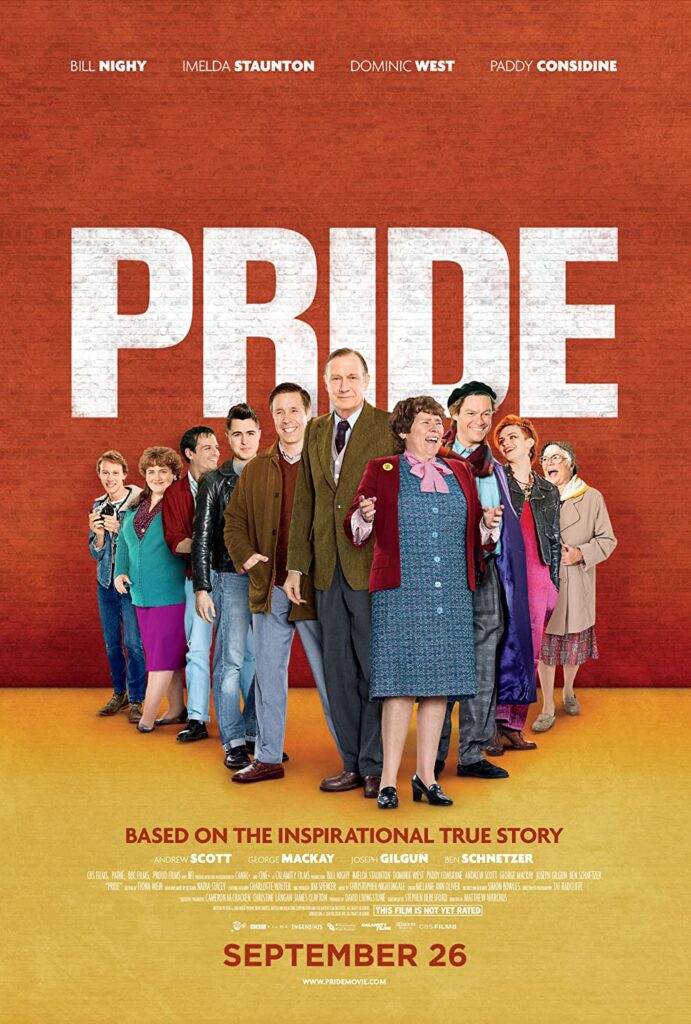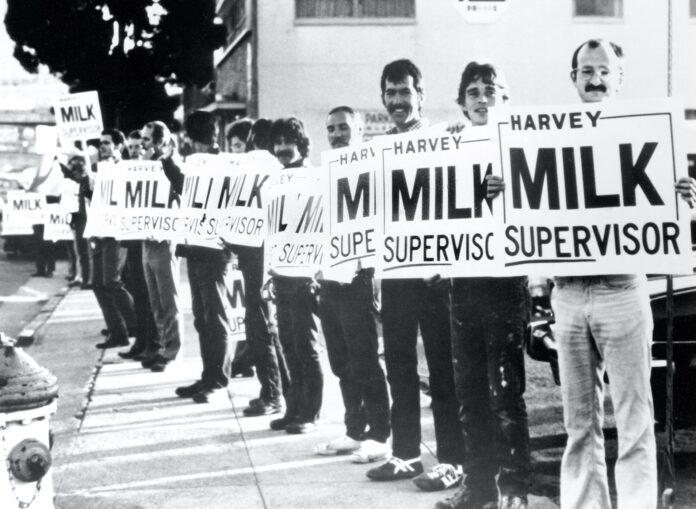Happy Pride! To prepare for this year’s festivities, here are ten films that should make viewers feel good and instill a strong sense of “Pride.”
“Gay USA,” (Ovid) directed by Arthur Bressan, Jr., chronicles gay pride parades held on June 26, 1977 in San Francisco, New York, San Diego, and Chicago. The film offers a snapshot of attitudes and experiences of lesbians and gays, straight allies, drag queens, and homophobes through a series of on-the-street interviews conducted by various camera crews. In some cases, the interviewers ask, “Are you gay?”, a question that generates a number of interesting responses. Some interviewees recount the empowerment they feel being out, while others describe the harassment they have encountered as a result of being identified as gay. It is a fascinating film and Bressan assembles a cross-section of humanity, featuring men and women, old and young, gay and straight, from various religious and racial backgrounds. The result makes queer lives visible.

The feel-good film, “Pride” (Showtime) chronicles the efforts of an LGBT group to raise money to support striking Welsh miners in 1984. This rousing period drama, based on a true story, shows the power of activism and how the queer community found solidarity with — and rallied to support — another oppressed group in Thatcher’s England. The lessons of unity are heartfelt, and even if they are preachy, they go down smoothly. Viewers may find themselves fighting back tears during “Pride,” which gets increasingly more emotional as it marches to its climactic gay pride parade. When a Welsh man comes out to one of his colleagues, or someone stands up to prejudice, it is extremely moving. Although the film is sentimental, and there are few dramatic surprises, there is still something undeniably endearing about this story and these people becoming empowered.
Gus Van Sant’s rousing, Oscar-winning biopic, “Milk” (HBO Max) and the Oscar-winning documentary, “The Times of Harvey Milk” (HBO Max) are galvanizing as they recount the horrific but inspiring story of Milk, one of the first openly gay elected officials, who was assassinated (along with San Francisco Mayor George Moscone) by Supervisor Dan White. Both films emphasize Milk’s legacy — he was able to change lives and inspire millions through his impassioned speeches — ultimately creating a community of LGBT activists.
“The Adventures of Priscilla, Queen of the Desert,” (Amazon Prime) remains a hilarious classic about two drag queens and a transwoman finding their self-worth in the Australian outback. Mitzi (Hugo Weaving) Bernadette (Terence Stamp) and Felicia (Guy Pearce) tease and take care of each other as they share character-building episodes — e.g., finding love, encountering homophobia — while taking a bus trip across the desert to perform in Alice Springs. The film is also a showcase for a trio of outstanding performances by Weaving, Stamp and Pearce who are great at slinging insults at each other or performing the fabulous musical numbers. There is an odd poignancy in “Priscilla,” but if the film’s message about acceptance is a bit obvious, it is certainly told with bitchy wit and wisdom.
“Disclosure,” (Netflix), is out trans director Sam Feder’s engaging, affirming documentary that evaluates how transgender characters are presented and consumed by both trans and non-trans viewers. Laverne Cox, Jen Richards, and dozens of other trans actors, filmmakers, and writers, discuss representation on screen, from negative portrayals in film, to how trans people were exploited on TV talk shows, where they were meant to educate audiences. “Disclosure” also addresses the whitewashing of black trans people in the 2015 film “Stonewall,” and the Oscar-winning “Boys Don’t Cry,” before it validates the strides being made in the entertainment industry. This fantastic documentary provides a critical awareness about how we are defined by what we watch.
“Pariah,” is Dee Rees’ outstanding 2011 feature debut based on her 2007 short of the same name. Alike (Adepero Oduye) is a teenager who hides her AG, (aggressive) butch identity from her religious mother Audrey (Kim Wayans), while also grappling with her desires for her classmate Bina (Aasha Davis). The dazzling cinematography reinforces images of Alike’s gender, sexuality, and identity, and Rees allows her characters to have quiet, revealing moments. The drama comes to a head in a searing, shattering moment, but Alike’s articulation of her desires and frustrations never seem cliché because of the Rees’ sensitivity as a filmmaker and Oduye’s incandescent performance.
“The Half of It,” (Netflix), written and directed by out lesbian filmmaker Alice Wu, is a fabulous romantic comedy, set in a rural high school. Ellie Chu (Leah Lewis) is an over-achieving senior who makes cash writing papers for her peers. When Paul Munsky (Daniel Diemer) hires Ellie to pen a love letter to Aster (Alexxis Lemire), she reluctantly agrees. Ellie is secretly crushed on Aster, and as she gets to know the object of Paul’s affection better, she comes to understand herself more. “The Half of It” may be steeped in a “Cyrano”–esque trope for the texting generation, but it shows how Ellie’s friendship with Paul improves both of their lives. It also illustrates how her unlikely connection with Aster sparks a sense of independence for each of the young women. This charming, thoughtful film offers tender and heartfelt messages about love.
“The Way He Looks” (Kanopy) is a sweet and sunny Brazilian romance about Leo (Ghilherme Lobo), a blind teenager whose friend, Giovana (Tess Amorim), assists him in school and walks him home. When Gabriel (Fabio Audi) joins their class, he befriends Leo and Gi, as she’s called. When a class assignment forces Gabriel and Leo to work together, the guys quickly form an intimate bond, which causes Gi to become jealous. What makes “The Way He Looks” so magical is how writer/director Daniel Ribeiro shows the two guys falling in love as Leo hugs Gabriel on a bicycle they share, or Gabriel guides Leo to dance to music. There is a tender sexual tension that shows how these two teenagers fall in love. They may never discuss their emotions, but they are all tactile. This film is sure to leave a smile in viewers’ hearts.
Out queer writer/director James Sweeney’s “Straight Up,” (Netflix) is a terrific rom-com with a twist. Todd (Sweeney) drops a bombshell on his two friends Ryder (James Scully) and Meg (Dana Drori) when he tells them, “I think I’m not gay.” This nervous, hyper-verbose, OCD guy soon meets Rory (Katie Findlay), a budding actress who shares his hyper-verbosity, his love of “The Gilmore Girls,” and his desire not to have sex. They couple up in comfortable domesticity — Todd’s job is house-sitting in fabulous abodes — and figure out how to manage a relationship that almost everyone around them questions. “Straight Up,” wrings knowing laughs from gay stereotypes and pop culture references, but Sweeney infuses his film with poignant moments as well as perceptive insights about love and relationships. In addition, the filmmaker employs inventive visuals that frame the characters to comment on the action and their emotions. This is a truly winning romcom.
